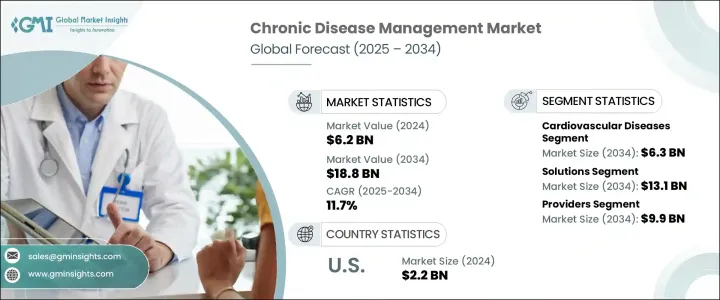
세계의 만성질환 관리 시장은 2024년에는 62억 달러로 평가되었고, 당뇨병, 심혈관 질환, 고혈압 등 만성질환 유병률 증가로 효과적인 관리 전략이 필요하게 되어 CAGR 11.7%로 성장할 전망이며, 2034년에는 188억 달러에 이를 것으로 추정되고 있습니다.
또한, 원격 의료 서비스, 원격 감시 장비, 전자 의료 기록 등 디지털 의료 기술의 진보는 만성 의료의 상황을 변화시켰습니다. 이러한 기술적 진보는 케어코디네이션과 임상적 의사결정을 강화할 뿐만 아니라 질병의 진행을 예방하고 병원 재입원을 최소화하며 치료의 애드히어런스를 높이는 예방적 개입을 지원하고, 궁극적으로 만성기 케어 제공을 변혁하고 시스템 전체의 효율을 높입니다.

또한 헬스케어 제공업체에게 실시간 데이터 인사이트를 제공하고 환자와 케어 팀 간의 의사 소통을 간소화하고 적시에 복용량 조정을 촉진하여 환자 중심의 간편한 케어 그리고 장기 건강 관리에 기여합니다. 또한 이러한 도구는 복잡하고 장기적인 병리학을 효과적으로 관리하는 데 필수적인 자체 모니터링, 교육 및 책임을 촉진하여 환자의 참여를 향상시킵니다.
| 시장 범위 | |
|---|---|
| 시작 연도 | 2024년 |
| 예측 연도 | 2025-2034년 |
| 시작 금액 | 62억 달러 |
| 예측 금액 | 188억 달러 |
| CAGR | 11.7% |
심혈관 질환 분야는 2024년에 22억 달러로 평가되었고, 2034년에는 63억 달러에 이를 것으로 예측되고 있습니다. 관상동맥질환, 심부전, 고혈압 등의 질환의 이환율이 상승하고 있기 때문에 포괄적인 관리 솔루션에 대한 수요가 높아지고 있습니다. 텔레헬스 플랫폼, 웨어러블 디바이스, 원격 모니터링 시스템은 혈압과 심박수 등의 바이탈 사인을 추적해 적시 개입을 촉진하고 치료 레지멘에 대한 환자의 컴플라이언스를 강화하는 데 도움이 됩니다.
2024년에는 공급업체 부문이 시장의 53.8%를 차지했고, 시장을 독점하고 있으며, 2025-2034년 연평균 복합 성장률(CAGR) 11.5%로 성장할 것으로 예측됩니다. 병원, 진료소, 전문 케어 센터 등의 건강 관리 제공업체는 만성질환 관리 서비스의 중심적 존재입니다. 디지털 헬스 기술을 통합함으로써 의료 제공자는 지속적인 치료를 제공하고 환자의 경과를 감시하며 필요에 따라 치료 계획을 조정할 수 있어 환자의 회귀와 만족도 향상으로 이어집니다.
미국의 만성질환 관리 시장은 2024년 22억 달러를 차지했고, 2025-2034년 연평균 복합 성장률(CAGR) 11.1%로 성장할 것으로 예측됩니다. 이 나라의 첨단 헬스케어 인프라, 디지털 건강 기술의 보급 및 지원 상환 정책이 이러한 성장에 기여하고 있습니다. 미국 인구의 만성질환 유병률 증가는 효과적인 관리 솔루션 수요를 더욱 촉진하고 있습니다.
세계의 만성질환 관리 시장의 주요 기업은 ResMed, Veradigm, IBM Corporation, Amwell, Oracle Corporation, Teladoc Health, Cerner Corporation, HealthSnap, Medtronic, Koninklijke Philips NV 등이 있습니다. 이러한 기업은 만성질환 관리를 강화하는 혁신적인 솔루션의 개발에 주력하고 있습니다. 원격의료 서비스 확대, 예측 분석을 위한 인공지능 통합, 헬스케어 공급자와의 파트너십 형성 등의 전략은 시장에서의 존재감을 강화하기 위해 채택되고 있습니다. 게다가 연구 개발에의 투자는, 환자의 인게이지먼트 및 치료 성과의 향상을 목표로 하고 있어, 이러한 기업은 진화하는 헬스케어의 전망 속에서 지속적인 성장을 목표로 하고 있습니다.
The Global Chronic Disease Management Market was valued at USD 6.2 billion in 2024 and is estimated to grow at a CAGR of 11.7% to reach USD 18.8 billion by 2034, driven by the increasing prevalence of chronic conditions such as diabetes, cardiovascular diseases, and hypertension, which necessitate effective management strategies. Additionally, advancements in digital health technologies, including telehealth services, remote monitoring devices, and electronic health records, have transformed the landscape of chronic care. These technological advancements not only enhance care coordination and clinical decision-making but also support proactive interventions that prevent disease progression, minimize hospital readmissions, and increase treatment adherence, ultimately transforming chronic care delivery and boosting system-wide efficiency.

Additionally, they empower healthcare providers with real-time data insights, streamline communication between patients and care teams, and facilitate timely medication adjustments, all of which contribute to more responsive, patient-centered care and long-term health management. These tools also foster greater patient engagement by promoting self-monitoring, education, and accountability, which are essential for managing complex, long-duration conditions effectively.
| Market Scope | |
|---|---|
| Start Year | 2024 |
| Forecast Year | 2025-2034 |
| Start Value | $6.2 Billion |
| Forecast Value | $18.8 Billion |
| CAGR | 11.7% |
The cardiovascular diseases segment was valued at USD 2.2 billion in 2024 and is anticipated to reach USD 6.3 billion by 2034. The rising incidence of conditions like coronary artery disease, heart failure, and hypertension has increased the demand for comprehensive management solutions. Telehealth platforms, wearable devices, and remote monitoring systems help in tracking vital signs such as blood pressure and heart rate, facilitating timely interventions, and enhancing patient compliance with treatment regimens.
In 2024, the providers segment dominated the market, accounting for 53.8% of the share, and is expected to grow at a CAGR of 11.5% from 2025 to 2034. Healthcare providers, including hospitals, clinics, and specialized care centers, are central to chronic disease management services. Integrating digital health technologies allows providers to offer continuous care, monitor patient progress, and adjust treatment plans as needed, leading to improved patient outcomes and satisfaction.
U.S. Chronic Disease Management Market accounted for USD 2.2 billion in 2024 and is projected to grow at a CAGR of 11.1% between 2025 and 2034. The country's advanced healthcare infrastructure, widespread adoption of digital health technologies, and supportive reimbursement policies contribute to this growth. The increasing prevalence of chronic conditions among the U.S. population further drives the demand for effective management solutions.
Key players in the Global Chronic Disease Management Market include ResMed, Veradigm, IBM Corporation, Amwell, Oracle Corporation, Teladoc Health, Cerner Corporation, HealthSnap, Medtronic, and Koninklijke Philips N.V. These companies are focusing on developing innovative solutions to enhance chronic disease management. Strategies such as expanding telehealth services, integrating artificial intelligence for predictive analytics, and forming partnerships with healthcare providers are being employed to strengthen their market presence. Additionally, investments in research and development aim to improve patient engagement and treatment outcomes, positioning these companies for sustained growth in the evolving healthcare landscape.